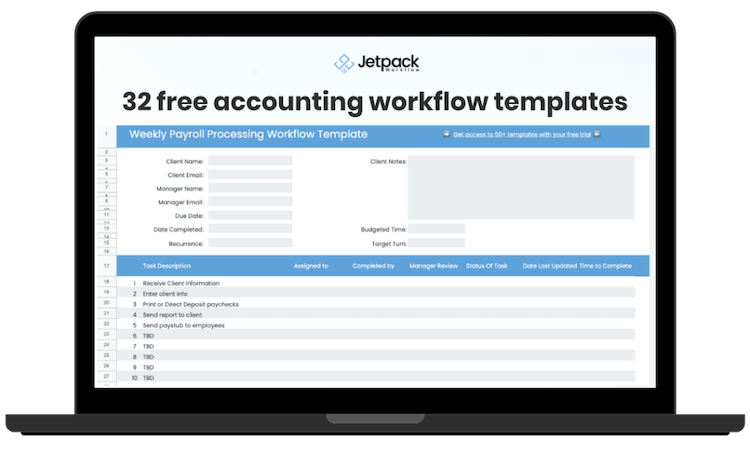How to Price Bookkeeping Services to Maximize Your Revenue

Like so many aspects of accounting, bookkeeping involves a lot of repetition. Since you often do the same work for multiple clients, there’s no reason to start from scratch each time you calculate your pricing. This article will look at the factors that should go into your pricing, how to market your services, and mistakes to avoid when calculating your prices.
Factors to Consider as You Figure Out Pricing for Your Bookkeeping Services
There are several variables to consider when calculating your pricing.
The first is your overhead. Overhead includes your fixed costs, like office space or software, and your variable costs, like travel expenses. Ensure you have a good handle on all the costs associated with running your business before setting prices.
Next, think about how much time it will take you to complete the work. This will vary depending on the size and complexity of the project, but it’s important to have a general idea of how long it will take you to do the work.
You should also consider your experience level and expertise. If you’re a small firm owner just starting, you may want to consider charging less than someone who has been in the business longer. You don’t want to underprice your services. However, having a low price may get your foot in the door.
Consider the value you’re providing to your clients. This includes things like peace of mind and saving time.
Size of Client
The size of the client company is also an important factor to consider when pricing your bookkeeping services.
If you’re working with a large company, they may have more complex needs and require more work from you. In this case, you may want to charge a higher price. They may also need specialized additional services and reporting.
On the other hand, if you’re working with a small company, they may have simpler needs and require less work. In this case, you may want to charge a lower price. Remember, even small businesses can be complex and may need additional support because they have fewer resources.
Location
Another factor to consider is location. If you’re located in a major city, you may be able to charge more than someone in a smaller town. Clients in major cities may be willing to pay more for bookkeeping services than clients in smaller towns.
However, remember more accountants and bookkeepers are working remotely. There is a larger pool of service providers competing for the same jobs.
Types of Services Offered
The type of bookkeeping services you offer will also affect your pricing.
You may want to charge a lower price if you only offer basic bookkeeping services, like data entry and financial statements. The price should match the time you expect to spend completing the work each month.
On the other hand, if you offer more complex services, like tax preparation or strategic planning, you may want to charge a higher price. Again, you should consider not just your time. Also, consider the value you are providing for your clients.
Market Rates
It’s important to consider market rates when pricing your bookkeeping services. If you live in an area with many bookkeepers, you may need to charge a lower price to compete.
If there are few bookkeepers or very high demand in your area, you can command a higher price for your services. Additionally, if you come highly recommended by other local businesses, you can typically charge higher prices. Make sure to keep your clients happy and let them know you appreciate referrals.
You can get an idea of market rates by talking to other bookkeepers in your area or searching for bookkeeping services online.
Remember, you’re also competing against remote bookkeeping firms, although many business owners are still reluctant to turn their financial information over to anyone other than a dedicated bookkeeper.
Hourly Versus Project-Based Pricing
Once you’ve considered all the factors above, you’ll need to decide whether to charge an hourly rate or per project.
Hourly pricing is typically seen as a better option for bookkeepers who are just starting out or don’t have much experience.
Project-based pricing can be good for bookkeepers who are more experienced or have a good idea of how long the project will take. The risk with project-based pricing is that projects may take longer than you estimate, or the scope of the project grows beyond the initial proposal.
To decide which type of pricing is best for you, consider your experience level, the type of work you’ll be doing, and the needs of your clients. Once you’ve considered all of these factors, you should have a good idea of how to price your bookkeeping services.
Payment Fees
When pricing your services, one item to keep in mind is which types of payments you will accept. If you accept electronic payments (either credit cards or ACH payments), you’ll want to consider the cost of payment fees.
Though they may seem relatively minor, 2-3% fees will quickly eat into your profits. When setting your prices, ensure you are charging enough to cover these fees.
Productizing Your Services vs. Offering Custom Services
Productizing your services means you offer a set package of bookkeeping services for a set
price. This is a good option if you want to simplify your pricing and make it easier for clients to understand what they’re getting.
Bookkeepers who productize their offers usually have different pricing plans that include various services. For example, a basic plan may include a monthly bank reconciliation for two accounts and financial statements delivered monthly. A higher plan may include several hours of monthly phone support, account payable collections, and coordination with a tax preparer at year-end. Productized services usually have a flat monthly fee.
Offering custom services means tailoring your services to each client’s needs. This is a good option if you want to offer a wider range of services. For custom pricing, you’ll need a general idea of how much you charge for each service and then consider if the total cost for all the services for the client is reasonable. With customized pricing, you can either charge a flat monthly fee or hourly.
To decide which option is best for you, consider your experience level, the type of work you’ll be doing, and your clients’ needs.
Focusing on Value Pricing
When you’re just starting out, it might be tempting to determine how much you want to earn per hour and back into your pricing from that point. Instead, you need to ask yourself how much value you provide for your client. If you can do the job more efficiently or insightfully, you’re likely adding more value for your client than your hourly wage goal.
Value pricing is a bookkeeping method that assesses the value of products or services based on their perceived worth to the customer rather than on their actual costs. This approach is useful for bookkeeping businesses wanting to focus on creating valuable products or services for their customers.
In many cases, customers are willing to pay more for items they believe are valuable. Value pricing can help businesses generate higher profits. Additionally, by focusing on value rather than cost, businesses can avoid making decisions that would result in losing money.
For example, if a firm decides to focus on value pricing, it may choose to sell its products at a higher price point than its competitors to make more profit. However, if the company instead chose to focus on cost, it might end up selling its products at a lower price point to save money. In general, value pricing is a more profitable method for businesses.
If you’re interested in learning more about value pricing, check out this episode of the Grow Your Firm Podcast with guest Ron Baker, considered the founding father of value pricing in accounting. Unpacking the concept of “Value Pricing 2.0,” Ron explained how subscription pricing is like pricing the relationship and the portfolio instead of pricing the customer in Value Pricing 1.0.:
Mistakes to Avoid When Pricing Your Services
One common mistake firms make as they’re thinking about pricing is failing to account for all of their costs. When calculating your prices, be sure to factor in the cost of software subscriptions for your clients and things like overhead, marketing, and employee salaries. Otherwise, you may barely break even – or worse, lose money on each engagement.
Another mistake is failing to consider the value of your time. Many firm owners underestimate how long it will take them to complete a project, which can lead to pricing that doesn’t adequately reflect the time and effort involved. If you’re unsure how long a project will take, it’s better to err on the side of caution and quote a higher price than you initially think is necessary. You can always negotiate down from there if necessary.
Finally, don’t be afraid to charge what you’re worth. Many business owners underprice their services in an effort to compete on price. This is often a mistake. If you don’t charge enough to cover your costs and leave a reasonable profit margin, you’ll quickly struggle to keep your business afloat. Remember, clients are often willing to pay more for quality – so don’t sell yourself short when setting your prices.
More on these concepts in this episode of the Growing Your Firm Podcast with guest Geraldine Carter, business strategist and coach to CPAs:
BONUS: Simplify Your Bookkeeping Workflows with This Free Resource
If you’re looking for simple workflow templates to stay on top of your projects and tasks for clients, access our collection of 32 customizable accounting workflow templates and checklists here. This free resource includes a ton of the most popular accounting templates including monthly bookkeeping, weekly accounting analysis, client onboarding procedures, and common tax return forms.






